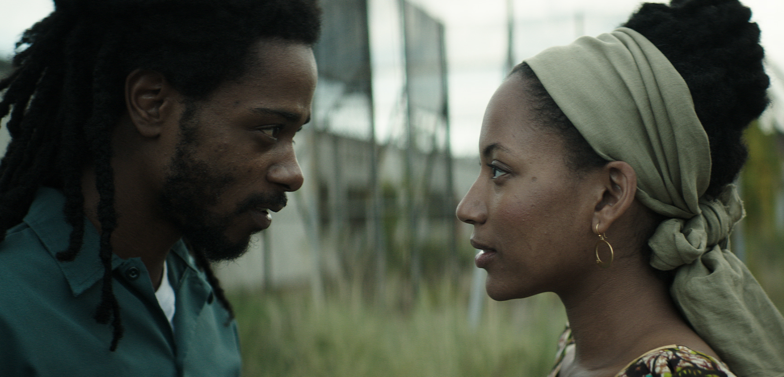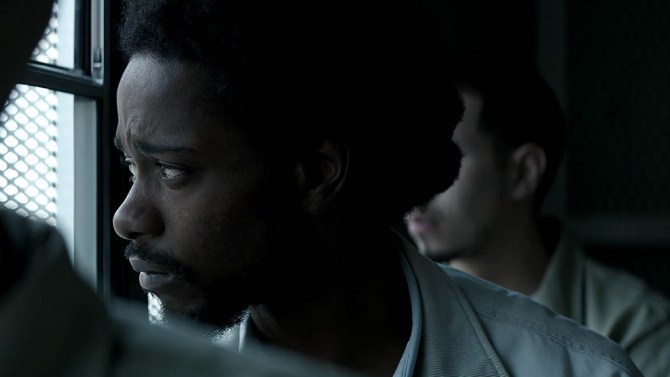“You never know how sacred your freedom is until it’s jeopardized.”
That’s the driving sentiment behind “Crown Heights,” a new film that tells a tale of friendship and perseverance in the face of a miscarriage of justice.
The drama is the story of Colin Warner, an 18-year-old immigrant from Trinidad who was arrested for a 1980 killing in New York that he played no part in. He ended up spending two decades behind bars before being freed — largely due to the efforts of his childhood friend Carl “KC” King, who ran down witnesses and lobbied lawyers to take on Warner’s case.
“This was a guy who grew up in prison,” said the film’s director, Matt Ruskin. “He was an 18-year-old kid when he was charged with a murder he had nothing to do with, and he became an adult in one of the harshest environments imaginable.”
Warner was released in 2001 and won a $2.7 million settlement from New York authorities for their wrongful prosecution. He now lives quietly near Atlanta with his wife and daughter.
“My case which was so exceptional and strange is you had one person who literally put his life on hold to assist me,” Warner said. “There are not too many people alive like that.”
He’s now a property owner and a landlord, but he says he still struggles to adjust to life as a free man.
“I don’t believe you can imagine what 21 years in prison can do to someone,” he said.
Prison “was more mental than physical … I got to work trying to maintain my sanity in a madhouse, because that’s what prison was.”
When he got out, he said, “My wife had to hold my hand. My friends had to hold my hand the first couple of years I was here.
“I am still getting back into society and I try to keep my life as simple as possible,” he said. He saw a psychiatrist for a while, “but I thought I did not receive what I needed. The person you’re speaking to now was basically put together by himself.”

Lakeith Stanfield and Natalie Paul star in "Crown Heights," the story of an 18-year-old sent to prison for a murder he didn't commit.
Shorter sentence for actual gunman
The killing that put Warner in prison happened in April 1980, in Brooklyn. Warner — played by actor Lakeith Stanfield, from the recent film “Get Out” and the television show “Atlanta” — had a prior arrest for carrying a pistol, and he was mistakenly identified by a witness from a book of mug shots. Police then leaned on other witnesses to match that shaky ID.
Even though detectives confirmed a different person shot the victim, Mario Hamilton, prosecutors kept charges against Warner as an accomplice. Both suspects were tried together and convicted even after a key witness changed his testimony on the stand.
Warner was sentenced to 15 years to life. He was released in 2001 after a judge threw out his convictions. The actual gunman, who was under 18 at the time, got nine years and was paroled in 1989.
It took two years for his case to come to trial — two years in which Warner was held without bail at New York’s lockup on Rikers Island. Knowing he was innocent, Warner struggled to adjust to prison: He spent about four of his first 10 years in solitary confinement. That disciplinary record and his refusal to admit guilt and express remorse for Hamilton’s killing cost him his first shot at parole.
Ruskin said a turning point came with the death of Warner’s grandmother, who had helped raise him in Trinidad.
“He said he realized that time was slipping away, and that life was continuing on, even though his had come to a grinding halt,” the director said. “He became much more active not only in fighting for his freedom, but he made a very conscious decision to be present and live his life wherever he was at that moment, rather than fighting and avoidance and what he said was letting things get away from him.”

Colin Warner (Lakeith Stanfield) faces a life behind bars for a killing he didn't commit in "Crown Heights," based on Warner's real-life story.
Drama based on hard truth
The film is scheduled to hit theaters Aug. 25. Though it is a dramatization of Warner’s story, it draws heavily on source documents and interviews with the participants. For instance, when Warner is convicted — despite a prosecution witness changing his story on the stand and a total lack of physical evidence — the judge says, “Is this verdict true? I don’t pretend to know.” That line came straight from the trial transcripts, Ruskin said.
Both King, played by former NFL defensive back Nnamdi Asomugha, and Warner were involved in shaping the script from the beginning. Ruskin said he recorded dozens of hours of interviews with them about their experiences, and they had several lengthy but less formal conversations during production.
“They had an open invite while we were shooting,” he said. “While I was writing the script, they spent countless hours talking with me about their experiences.”
Warner said he still feels like he has the mark of an ex-convict on him, and he tries to teach his 10-year-old daughter the importance of making good decisions. Nor has he fully escaped tragedy in his new life: His 13-year-old son drowned two years ago on the Fourth of July. He always tries to help people, “because without help, I wouldn’t be talking to you right now.”
Meanwhile, King is still in New York, working as a process server — a job he took to help meet lawyers who could help his friend. Ruskin said King is still trying to help people like Warner, “and there is no shortage of cases that he’s become aware of.”
“He has always continued to do this type of work since Colin’s exoneration,” Ruskin said.
The killing for which Warner was imprisoned was one of more than 1,800 in New York that year. It was part of a nationwide surge in violence that started in the 1960s and peaked in the 1990s, leaving police, prosecutors and politicians scrambling.
“It was just clearing the cases you had on your desk and doing whatever you had to do to get convictions,” Ruskin said. “On the one hand, it was the height of the crime wave in New York, and I think these people were completely overburdened. On the other hand, this kind of misconduct was completely inexcusable and led to situations like there where you have an innocent kid spending 20 years of his adult life in prison.”
Those pressures also overwhelmed the courts: Warner had a series of public defenders at different hearings before his 1982 trial, “so there was no continuity in his defense until the trial started, Ruskin said. “You had people who weren’t familiar with the details of his case, didn’t believe in his innocence or just weren’t present.”
Potential return to old policies
Ruskin’s film marks the passage of time with politicians like Ronald Reagan and Bill Clinton, New York Mayor Ed Koch and state Gov. George Pataki vowing to get tough on crime. A generation later, many of their successors have been rethinking those policies, particularly the harsh minimum sentences imposed on drug offenders.
But under the Trump administration, Attorney General Jeff Sessions has moved to roll back decisions made by his predecessors to de-emphasize nonviolent drug crimes and avoid charges that would expose nonviolent offenders to some of the mandatory minimum terms imposed at the height of the crime wave.
Ruskin said the policies of the past mean there likely are more cases like Warner’s — and going back to them will likely mean more in the future.
“When the focus is on punishment rather than justice, and when you’re looking at statistics rather than the health of a community, I think it’s inevitable that there will be casualties of an aggressive and inhumane system,” he said.